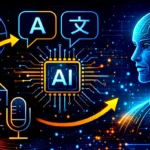Artificial intelligence (AI) has become widely popular in the last few decades; AI is the theory and development of computers that can perform tasks commonly associated with intelligent beings, such as decision-making, speech recognition, visual perception, and so on. This article discusses Artificial Intelligence (AI) with applications, history, categories, and market value.
What is Artificial Intelligence?
The modern definition of artificial intelligence or AI is the study and design of intelligent agents where an intelligent agent perceives its environment and takes actions that maximize chances of success. Artificial Intelligence was coined by John McCarthy in 1956 and defined as “the science and engineering of making intelligent machines [1].” Other proposed names include computational rationality, computational intelligence, and synthetic intelligence.
High-profile examples of AI may include self-driving cars, medical diagnosis, creating art such as poetry, proving mathematical theorems, playing games such as Chess, search engines such as Google search, online assistants such as Siri and Alexa, image recognition in photographs, spam filtering, predicting flight delays, prediction of judicial decisions and targeting online advertisements.
“A computer would deserve to be called intelligent if it could deceive a human into believing that it was human.” — Alan Turing [2]
What are the Categories of Artificial Intelligence?
Artificial Intelligence can be divided into two basic categories:
- Weak AI; acts upon and is bound by the rules imposed on it, and it cannot go beyond those rules.
- Strong AI, also known as True Intelligence or Artificial General Intelligence.
Weak AI is an approach considering that AI is always a simulation of human cognitive functions. Weak AI is bound by the regulations imposed and cannot go beyond those rules. A good example of weak AI is the characters in a computer game that act believably within the context of their game character but cannot do anything beyond that [3]. Weak AI is also known as narrow artificial intelligence.
Strong AI is a form of machine intelligence similar to human intelligence. Key characteristics of a strong AI include the ability to reason, solve puzzles, make judgments, plan, learn and communicate. It should also have consciousness, objective thoughts, self-awareness, sentience, and sapience. Strong AI is also called true Intelligence or Artificial General Intelligence (AGI).
“The development of full artificial intelligence could spell the end of the human race. […] It would take off on its own, and re-design itself at an ever-increasing rate. Humans, who are limited by slow biological evolution, couldn’t compete, and would be superseded.” — Stephen Hawking
Why is Artificial Intelligence Important?
The term has become more famous due to advancements in artificial intelligence and device learning. Nowadays, artificial intelligence has played an important role in our daily life with the ability to process faster and make complex decisions based on that data.
Artificial intelligence forms the basis of all computer learning and the future of all complex decision-making. Machine learning is a field of artificial intelligence where machines are responsible for completing everyday tasks and are believed to be smarter than humans.
“Anything that could give rise to smarter-than-human intelligence — in the form of Artificial Intelligence, brain-computer interfaces, or neuroscience-based human intelligence enhancement — wins hands down beyond contest as doing the most to change the world. Nothing else is even in the same league.” — Eliezer Yudkowsky
How are growing global Artificial Intelligence markets?
According to Fortune business insights [4], the global Artificial Intelligence market value was USD 387.45 billion in 2021, and it is expected to reach USD 1394.30 billion by 2029, registering a compound annual growth rate of 20.1% from 2022 to 2029.
“Within a few decades, machine intelligence will surpass human intelligence, leading to The Singularity — technological change so rapid and profound it represents a rupture in the fabric of human history.” — Ray Kurzweil





